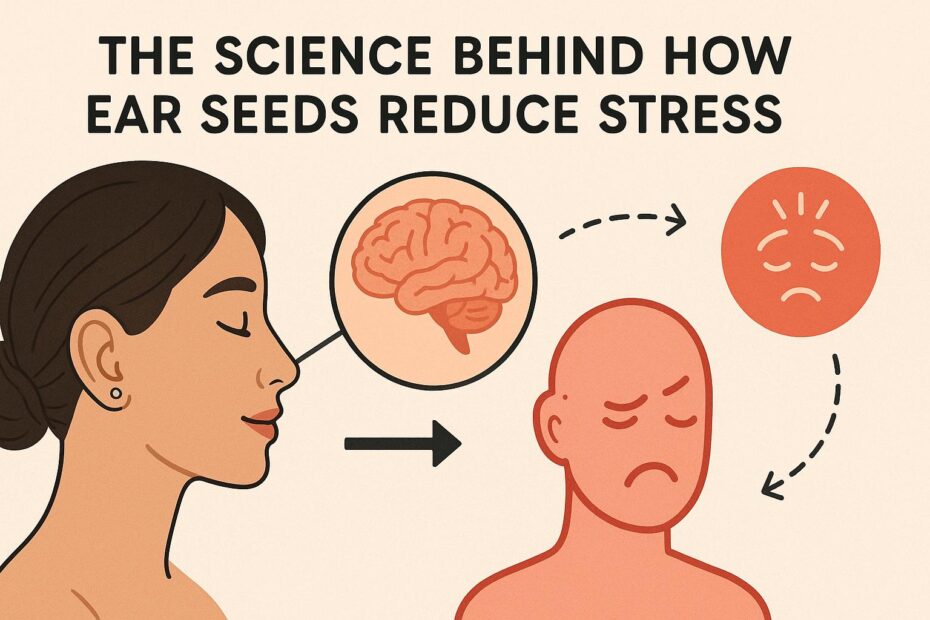Stress affects nearly everyone. It can cause headaches, tiredness, and anxiety. But there’s a small, natural tool that may help: ear seeds.
What Are Ear Seeds?
Ear seeds are tiny beads placed on points of your ear. They come from a practice called auriculotherapy. This is a type of acupressure that uses the ear to treat the body.
How Do They Work?
Your ear has many pressure points. Each point links to a different part of your body. When you press these points, it sends signals to your brain.
These signals help calm the nervous system. They also help your body release natural chemicals like endorphins. Endorphins are known as “feel-good” hormones. They help reduce pain and bring a sense of calm.
The Science Behind It
The idea behind ear seeds comes from a field called auriculotherapy. This is based on the belief that the ear is like a map of the body. Each part of the ear connects to a different organ or system. By applying pressure to certain points, it may help to restore balance in the body and mind.
But this idea isn’t just ancient tradition. There is actual science beginning to support it.
The Brain’s Role in Stress
To understand how ear seeds reduce stress, we need to look at what stress does to the brain. When you’re under stress, your brain sends a signal to release cortisol and adrenaline. These are the body’s “fight or flight” hormones. They help in emergencies, but too much of them over time can harm your body and make you feel anxious or exhausted.
Research suggests that stimulating specific points on the ear may help slow down this stress response. It does this by working with the autonomic nervous system, which controls automatic functions like heart rate, digestion, and breathing.
There are two main parts to this system:
- The sympathetic nervous system, which speeds things up and triggers stress.
- The parasympathetic nervous system, which slows things down and helps you relax.
When you apply pressure to points on the ear, it may activate the vagus nerve, one of the key parts of the parasympathetic system. This nerve connects the brain to the heart, lungs, and gut. By stimulating it, ear seeds may help calm your heart rate, relax your muscles, and reduce feelings of tension.
Hormone Regulation
In some small clinical studies, people who used ear acupressure (which includes ear seeds) showed lower levels of cortisol. This suggests their bodies were under less stress. Some also reported better sleep, less anxiety, and even improved mood after regular use.
It’s thought that pressing these points may encourage the release of endorphins and serotonin. These are chemicals in the brain that help you feel good and reduce pain.
Brain Imaging and Electrical Signals
Some studies using brain imaging and electrical activity scans have shown changes in brain wave patterns after ear stimulation. These patterns suggest a shift toward a more relaxed mental state, similar to what happens during meditation or deep breathing exercises.
This helps explain why people often feel calmer, more centred, and even sleepy after using ear seeds for a few days.
This growing body of research gives early but promising signs that ear seeds can support stress relief. While more high-quality studies are needed, especially with larger groups of people, the current findings are enough to get many wellness experts and health practitioners interested.
In short: ear seeds may be tiny, but their effect on the nervous system could be much bigger than you might expect.
Easy and Non-Invasive
Unlike needles used in acupuncture, ear seeds are painless. They stick to your ear with adhesive tape. You can press them gently during the day to boost their effect.
Safe for Most People
Ear seeds are natural and drug-free. Most people can use them safely. Still, it’s best to talk to a health professional before starting.
Conclusion
Ear seeds may seem simple, but they tap into a powerful system in the body. By calming the brain and reducing stress hormones, they offer a gentle way to find relief. If you’re looking for a natural way to relax, ear seeds might be worth a try.
